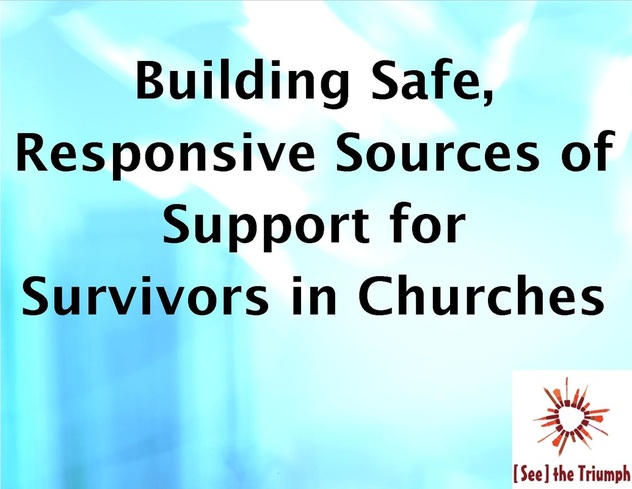|
By Christine Murray, See the Triumph Co-Founder
This month, we’re sharing a series of blog posts and resources to help people in faith communities support survivors of intimate partner violence (IPV) and challenge the stigma that often surrounds abuse in these communities. Why are we focusing on faith communities, and particularly on Christian churches? The stigma surrounding IPV in churches was a major theme we heard from the survivors who participated in our research. Some of our participants faced a major stigma within their churches when they sought help or when others in their faith communities learned about the abuse they had experienced. The majority of these experiences occurred in Christian denominations, so we don’t yet have enough information about how IPV is viewed within other faith traditions to be able to address those dynamics, and therefore we are currently focusing on resources to address the stigma surrounding IPV in Christian faith communities. Because religious and spiritual beliefs and practices can be such a central part of people’s lives, one’s faith-based values are a potentially major influence on the decisions they make about how to respond to abuse--such as whether to leave an abusive partner. Another important reason that we’re focusing on churches is because they are so often a first line of support for many people who have experienced abuse. Survivors who may not feel comfortable seeking support from places like the police or a domestic violence agency may feel more comfortable seeking support from leaders and/or members of their religious groups. Therefore, the responses that survivors receive from within their faith communities can have a major impact on how they perceive their abuse and whether they will seek additional help elsewhere. We know that many faith communities and religious organizations are working actively to promote nonviolent, healthy, and safe relationships in their own congregations and their wider communities. Later this month, we’ll highlight some great examples of ways that churches can take action against IPV, in hopes of spurring on other religious groups to take action. Before we move to sharing resources for how faith communities can challenge the stigma surrounding IPV, we thought it was important to provide a context for understanding how this stigma may be perpetuated in some faith communities. Today, I’ll focus on the blame and shame that survivors may encounter in their faith communities. In the coming days, I’ll focus on other aspects of that stigma, including isolation and how religious beliefs may be used to perpetuate further abuse. We’ve shared several blog posts on how victim-blaming is a major part of the stigma surrounding IPV in general. For example, see our posts on Victim-Blaming and Stigma and Victim-Blaming: Why You Might Be Part of the Problem. Victim-blaming certainly isn’t unique to churches. However, there were some unique aspects to that blame when our study participants experienced it in their faith communities. For example, consider the following participants’ quotes describing their experiences of feeling blamed by members and leaders of their faith communities. First, one woman was told in response to disclosing the abuse she had experienced, “You need to submit yourself to God and become a better wife.” Other participants heard messages that they were being abused due to a lack of faith: “A priest told me that this was happening to me because i didn't have enough faith.” Still others noted that they felt that they were held fully responsible for their marriages, regardless of the abuse, as illustrated by the following quotes:
I believe that the blame that survivors encounter from within their faith communities can be especially difficult for them to overcome because it’s wrapped up in their beliefs about God and faith. I imagine that this can spiral into a chain of negative beliefs, such as that they are being abused because they are being punished by God or that there is something so inherently wrong with them that they deserve to be treated abusively. Ending the stigma surrounding IPV within churches will require stopping the victim-blaming within these faith communities. Stay tuned throughout this month for more ideas and resources to help challenge this stigma so that faith communities can work toward becoming safe and responsive sources of support for survivors. Comments are closed.
|
Archives
July 2024
CategoriesAll About Intimate Partner Violence About Intimate Partner Violence Advocacy Ambassadors Children Churches College Campuses Cultural Issues Domestic Violence Awareness Month Financial Recovery How To Help A Friend Human Rights Human-rights Immigrants International Media Overcoming Past Abuse Overcoming-past-abuse Parenting Prevention Resources For Survivors Safe Relationships Following Abuse Schools Selfcare Self-care Sexual Assault Sexuality Social Justice Social-justice Stigma Supporting Survivors Survivor Quotes Survivor-quotes Survivor Stories Teen Dating Violence Trafficking Transformative-approaches |
Search by typing & pressing enter



 RSS Feed
RSS Feed